






We believe that every child can achieve and succeed. Our high aspirations, belief and high expectations create an environment which supports and challenges everyone to achieve their full potential, both inside and outside the classroom.
Our dedicated and enthusiastic staff are committed to providing every young person at Parkwood with the very best start in life and education of the highest possible standard. At the heart of everything are our core values – ‘Believe, Achieve, Succeed’. These are underpinned by our values – Knowledge, Leadership, Growth and Diversity and all our values are a central part of every students’ experiences at Parkwood.
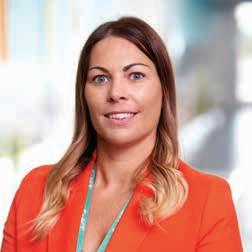
As an E-ACT academy, we ‘Think Big’ and ‘Do the Right Thing’ for our students and their families. In a rapidly changing world Parkwood E-ACT Academy offers a forward-thinking and dynamic learning environment. Our students benefit from a highly personalised curriculum underpinned by the use of innovative learning resources and a commitment to ensuring each and every student leaves Parkwood with the skills, knowledge and confidence to succeed. We are a team and the Parkwood spirit personifies our team spirit.
We believe that the very best schools and academies enable students to enjoy learning and great enrichment opportunities – our futures programme also encourages this. Parkwood E-ACT Academy does just that. Ask any student and they will tell you that they love coming to academy, and are excited about the future that Parkwood offers them.
To inspire, invest in and celebrate learning so that our students become confident, happy, successful individuals who have enhanced opportunities for their future.
Gemma Cottingham Headteacher
At Parkwood E-ACT Academy we are determined that our students succeed and leave us as confident, articulate and aspirational young people, fully equipped for life and work in the 21st century.
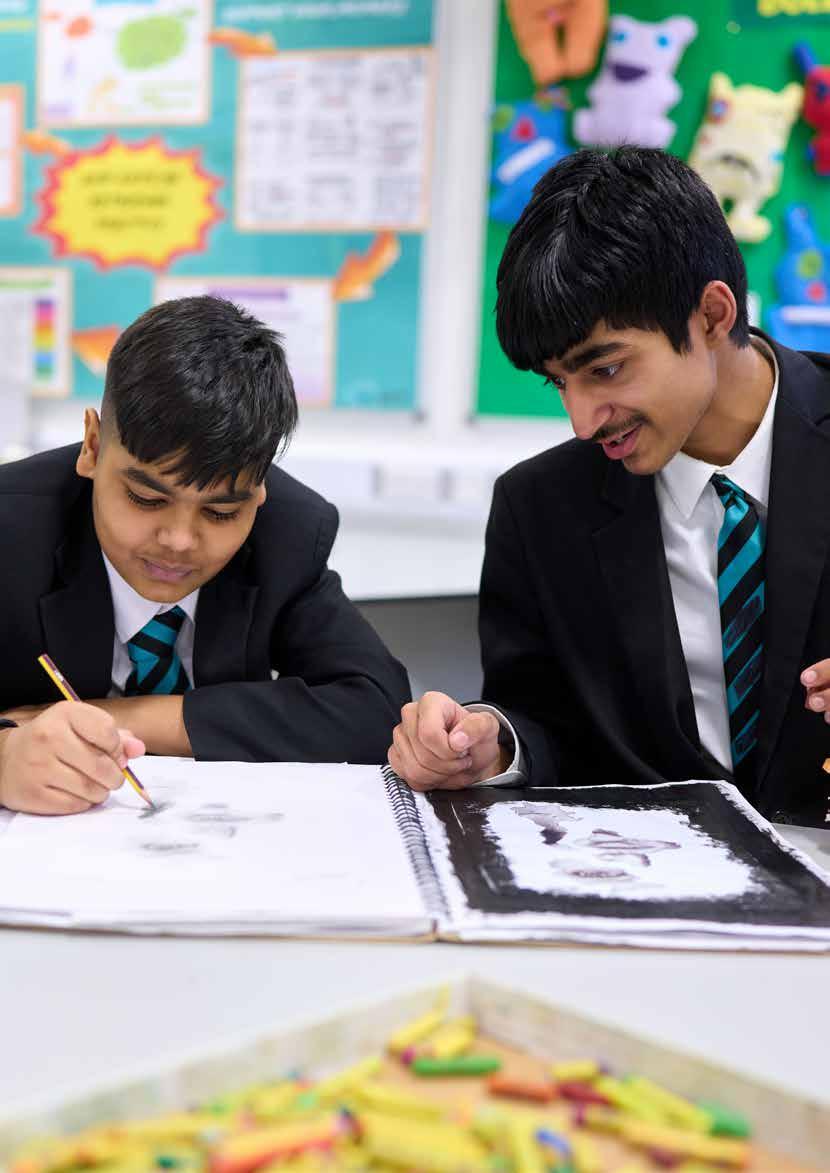
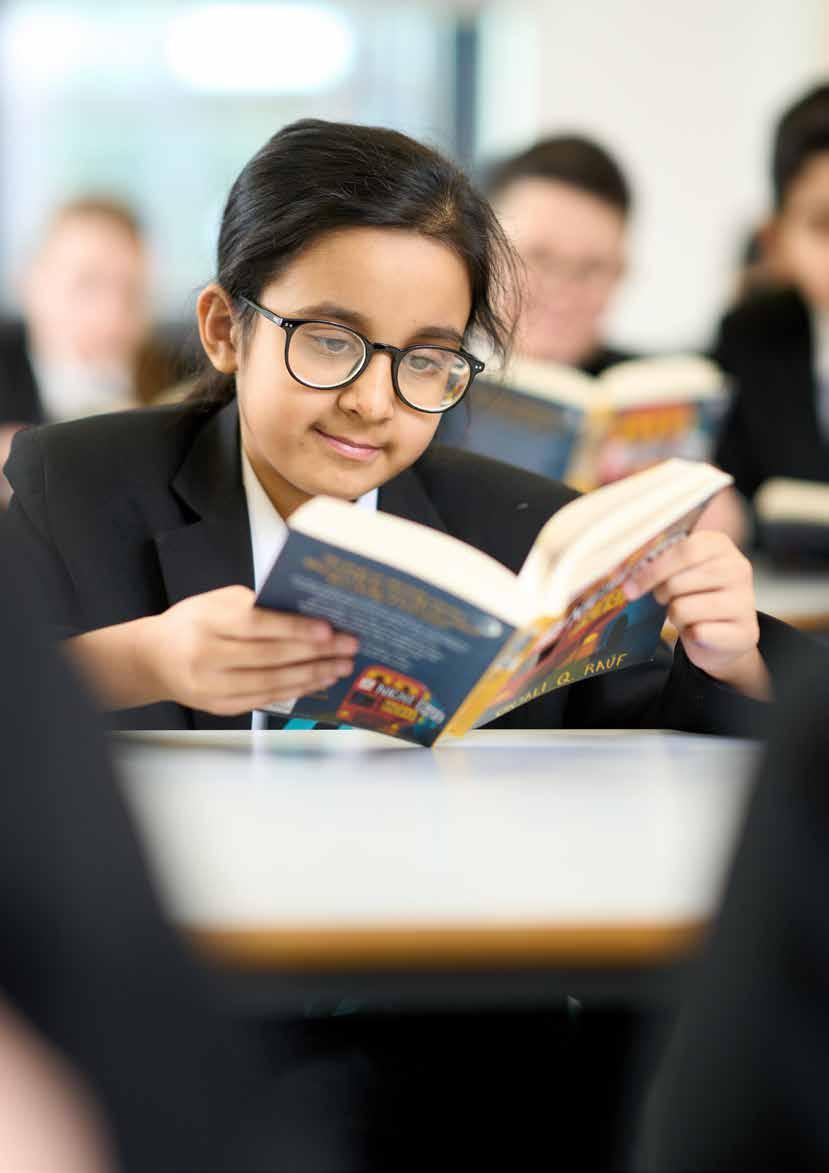
This school year you will choose your GCSE options. This can seem scary at first, but it’s all about perspective: this is your opportunity to take hold of the wheel and start to shape your own future.
Most further education courses, whether at school, sixth form, college or university will expect you to have GCSEs in English language, maths and science, so these three subjects are compulsory.
You will, however, need to choose your additional subjects. If you’re the kind of person who already has a good idea about what career they want in the future, it might pay to work backwards.
Think: my end goal is to be a doctorhow do I get there?
Useful links:
• www.bbc.co.uk/bitesize/careers
• www.prospects.ac.uk/ extra.shu.ac.uk/heppsy/learners/
MAHATAMA GANDI
What GCSEs should I take to become a civil engineer?
Definitely: maths; English language; science
Think about: engineering
What GCSEs should I take to become a doctor or a dentist?
Definitely: maths; English language; science
Think about: a spread of other subjects that you enjoy
What GCSEs should I take to become an accountant?
Definitely: maths; English language
Think about: traditional academic subjects
What GCSEs should I take to become a police officer?
Definitely: maths; English language; science
Think about: physical education; religious education; a modern foreign language
What GCSEs should I take to become a laboratory technician?
Definitely: maths; English language; science
Think about: a spread of other subjects that you
What GCSEs should I take to become an architect?
Definitely: maths; English language; science
“ The future depends on what you do today”
BTEC stands for Business and Technology Education Council. BTECs are equivalent to GCSE but are more vocational in nature. Often they include more coursework than examination content.
Coursework includes any work that is carried out and assessed whilst the course is in progress. Coursework gives students the opportunity to demonstrate skills and techniques they would be unable to use in a final examination. These are delivered within controlled conditions within the academy.
The amount of coursework and its contribution to the final grade will vary from subject to subject. When making choices students should be careful to consider where their strengths lie. Coursework can take a lot of pressure off the final exam, especially now that these are done at the end of the course.
The English Baccalaureate (or EBacc) is a performance measure for academies, schools and colleges. It is not a qualification in itself. The measure recognises where students have secured a grade 5 (or equivalent) or better across a core of academic subjects.
The English Baccalaureate (or EBacc) is made up of English, Maths, History or Geography, the Sciences and a Language. These subjects were included to ensure that students had the opportunity to study a broad core of subjects, so that doors were not closed off to them in terms of future progression. For example, for students hoping to go to university, the Russell Group* guide on making informed choices for post 16 education identifies ‘facilitating subjects’ at A Level. These are the subjects most likely to be required for preferred entry to degree courses and ones that will keep most options open. The subjects they identify are those included in the English Baccalaureate - Mathematics, English, Physics, Biology, Chemistry, Geography, History and Languages. This core of subjects is deliberately kept small to allow the opportunity for further and wider study options.
Whilst the academy has a focus on academic achievement and high aspirations for our students, you will be guided into this route based on your GCSE target grades and how you are doing in Year 9.
*TheRussellGrouprepresents24leadingUK universitiesincludingOxford,Cambridge,Durham, NottinghamandBristol.


Careers in Year 9 is about understanding where and how school subjects link to careers. You will be involved in a huge variety of activities which will allow to develop your knowledge and understanding on jobs, your skills, strengths and weakness, and your career dreams.
Careers Advisor: Mr Swallow

Contact: scott.swallow@pwa.e-act.org.uk
Having a job is a huge part of a person’s life and for many people they spend more time in the year with their work colleagues than with their family, so it is really important to enjoy your job. When you come to applying for jobs there will be so many new roles that don’t exist today. Over the next few years you will be exploring how careers sectors will change and thrive.
Activities you will be involved with during Year 9:
Virtual Subject taster days with local universities
Discover US mentoring
• Online Support for options evening, through videos and live talks
1-1 interview for option subjects
Virtual visits to local business
• STEM activities
• PSHE lesson
Video interview during lessons and tutor time
Virtual Red Brick University talks
• Study skills sessions
• Careers related reading during tutor
Career definition:
A career is the job or profession that someone does for a long period of their life. What career do you want to have? - You’re in the driving seat now, and you’re beginning to shape your own education! This is the first time you can focus on the subjects you like the most and feel you will do well at.
“You may not always end up where you thought you were going but you will always end up where you are meant to be.”
There are things that we feel every child at Parkwood should just know. Knowledge is important. Knowing leads to the ability to create and innovate. Our curriculum reflects the community we serve while also being aspirational and ambitious for our students to open their minds to new learning and experiences.
We believe in the importance of learning a language. We already have such a diverse community of languages spoken at Parkwood and we seek to build on this. We respect and celebrate the diversity we are lucky to have. We are advocates for equality continuing to strive for positive change in our community and in our world, aiming to be a good citizen.
We want students to be able to engage in thoughtful debates. This is done through building a culture of a love of reading and engaging with high quality texts, explicitly teaching ambitious vocabulary and encouraging articulate discussion.
No subjects are closed off to students. Students have a grounding in all subject areas for three years before they narrow any further study. Options are guided to advise students to maximise their own personal achievement and allow them to progress to their next destinations. Students experience success and as a result are motivated and empowered to work hard even when things might go wrong.
Home language GCSEs
We also offer an opportunity to take a GCSE in your home language where one exists. We help to guide you as to whether this is right for you as well as offering some tutoring preparation prior to the exam.
Beginning 20th March 2023
Option information week 22nd March 2023
Option evening
24th March 2023
From 17th April 2023
Summer Term
Summer Term
Options forms deadline
Guided options meetings
Final confirmation letter
KS3 to 4 transition day

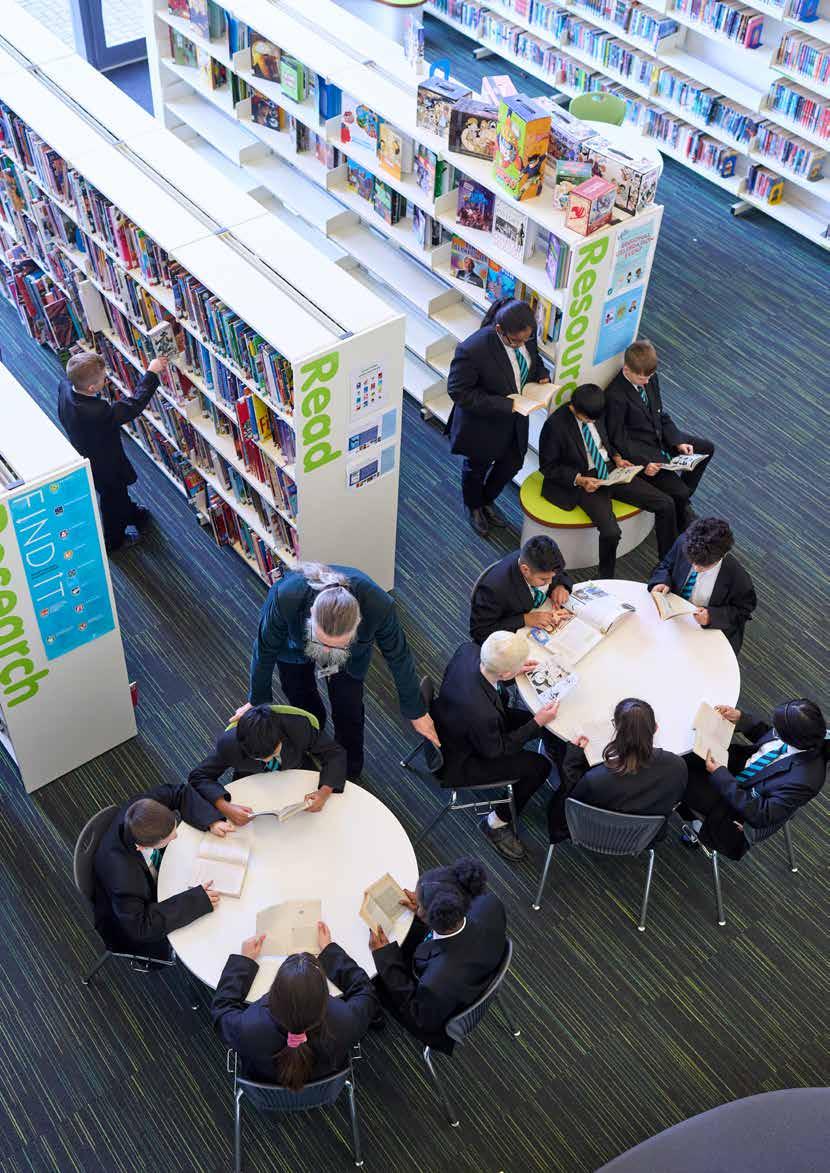
History
• Geography
GCSE art (fine art)
• GCSE art (art textiles)
Maths Spanish Triple science
• Maths
• Combined science
RSE (relationships and sex education)
PSHE (personal social and health education)
History Geography
Technical award in Engineering
GCSE computer science
GCSE food and nutrition
GCSE geography
• GCSE drama
Music
GCSE physical education
• GCSE religious studies
BTEC sport
GCSE art (fine art)
GCSE art (art textiles)
• Technical award in Engineering
GCSE food and nutrition
• GCSE geography
• GCSE drama
Music
GCSE physical education
• GCSE religious studies
BTEC sport
GCSE Spanish

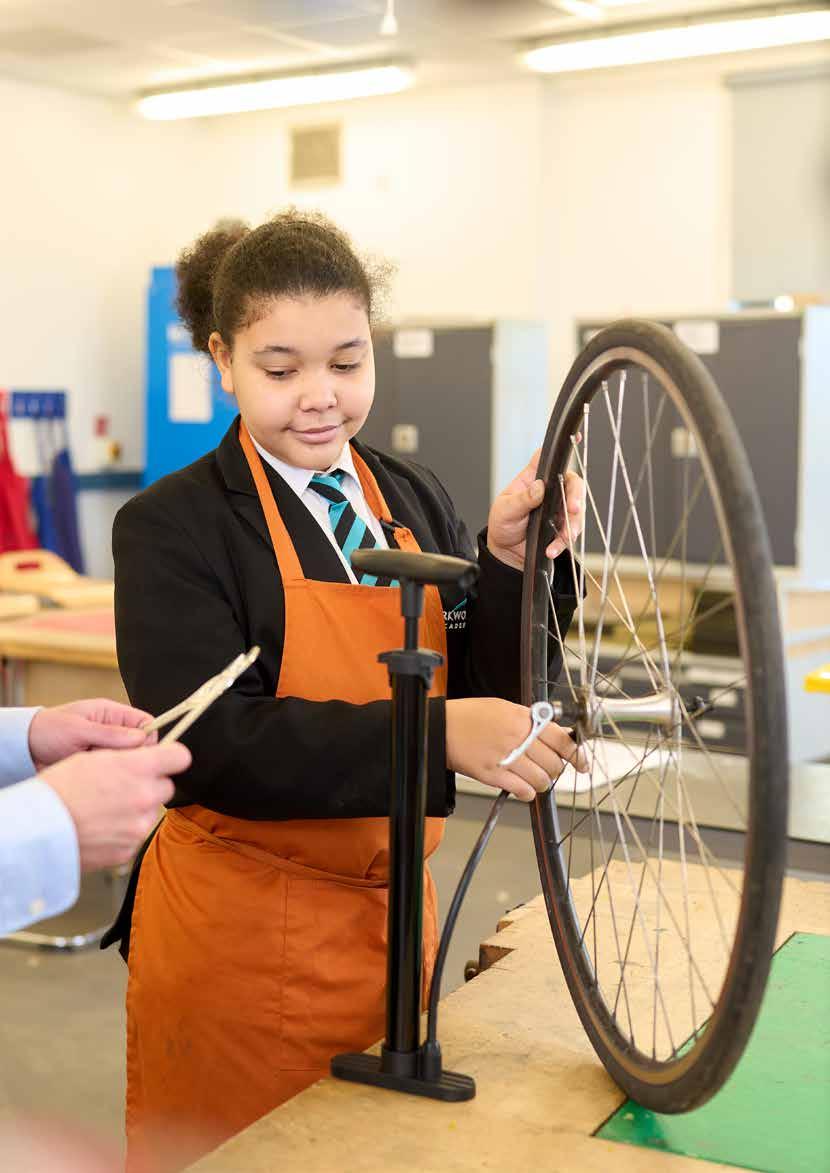

Exam Board - AQA
Contacts - Mr D Clayton daniel.clayton@pwa.e-act.org.uk
Graded - From 9-1
There are many things students can go on to do with a GCSE in Art and Design. They may take an AS Level in Art and Design, or a Vocational A Level in Art and Design or a related subject.
Studying Art and Design helps with inspiration and creativity in applying your own ideas, allowing you to produce exciting pieces of work.
GCSE Fine Art has been an an available option since 2021, allowing students to explore creativity within the highest standard.
GCSE Fine Art will develop practical ability to the point where students are completely independent in the creation of artefacts. Skills will be developed within the areas of drawing and painting whilst obtaining an all round appreciation for art in its varied forms.
• You will use a wide range of materials You will gain new skills and knowledge of Art and Design
• You have the opportunity to work with paint, charcoal, mixed media, print making, pastels, sculpture, clay, pencil, digital media and your imagination.
Over the course of the two years, you will study two projects. The first project will take place in Year 10 and use the theme of identity. This theme will have a focus on portraits and the human form as well as looking at your own personal hobbies and interests and turning them into art.
The second project will be a mock exam project and will start in Year 11 and run from September till December. If you enjoy drawing and painting then you will enjoy the art exam. It is a whole two days of making art!
Unit 1 - is a portfolio of work which is divided into two projects and each has four assessment objectives to gain.
Unit 2 - takes place in Year 11 in the form of exam preparation and an exam.
Your work is graded in the following four assessment objectives:
AO1 - Is to develop your ideas for your project by researching a theme. You need to research one or more artists and progress your ideas.
AO2 - The objective is to experiment with materials and techniques to get the right process for your project. This means putting all the information from AO1 in this section.
AO3 - The objective of this assessment is to plan for a final piece or summary of your project. This means ironing out any potential problems with your project. AO4 - This is your summary or final piece of art work.
Exam Board - AQA Contacts - Zoe Smart (Head of science - zoe.smart@pwa.e-act.org.uk) and Mr Mclean (Deputy Head of sciencedaniel.mclean@pwa.e-act.org.uk)
Graded - From 9-1
Biology is part of the Combined Science, Trilogy.
This is a double award course which is equivalent to 2 GCSEs, you will be taught Biology, Chemistry and Physics topics within this course however your final qualification will be called ‘combined science’.
There are 21 required practicals that you must complete as part of your Combined Science course and many of these practicals will be assessed during your final GCSE examinations. There are many other experiments and demonstrations which you will take part in during Y10 and Y11. There is no longer a coursework (ISA) element to the GCSE Science course.
• Cell biology, Organisation, Infection and response, Bioenergetics,
• Homeostasis and response, Inheritance, Variation and Evolution Ecology.
Maths Skills: Mathematical skills are crucial to science and students will be expected to apply many different mathematical skills within their science lessons. In the GCSE science exams questions will target maths skills at a level of demand appropriate to each subject. In Foundation Tier papers questions assessing maths requirements will not be lower than that expected at Key Stage 3. In Higher Tier papers questions assessing maths requirements will not be lower than that of questions and tasks in assessments for the Foundation Tier in a GCSE Qualification in Mathematics.
Each paper is 75 minutes long and you will sit all papers at the end of Y11. Each paper includes a range of multiple choice, structured, closed short answer, and open response questions.
As part of the Combined Science Trilogy you will sit a total of six papers (Biology, Chemistry and Physics).
Entry Level Science Qualification: In each year group a small number of students (including those who are new to English) may be entered for the AQA Entry Level certificate instead of the combined science GCSE. Your teacher will advise you if you have been selected for this qualification.
Triple Science: This pathway leads to 3 separate GCSE’s (Biology, Chemistry and Physics) and is intended for high achievers who want to pursue a career in science and study science A Levels.
Your exam for triple science will be 1hr 45mins long.

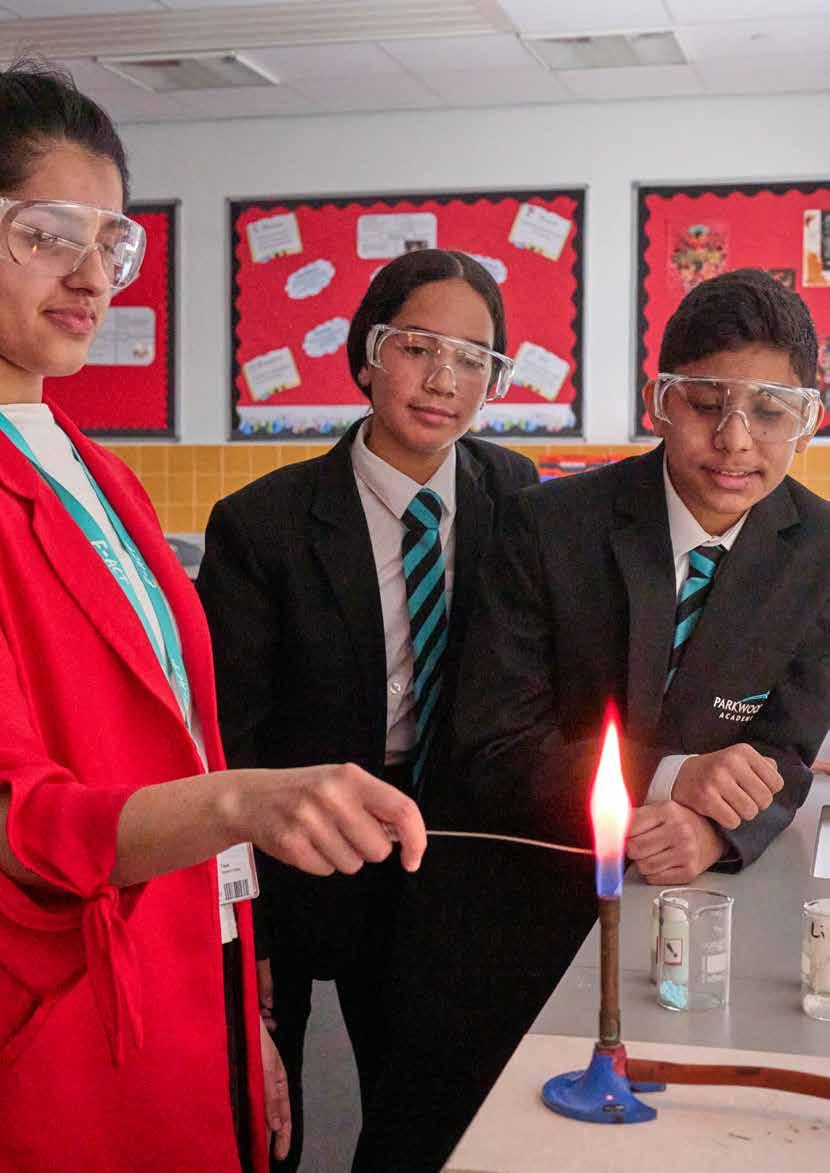
Exam Board - AQA
Contacts - Zoe Smart (Head of science - zoe.smart@pwa.e-act.org.uk) and Mr Mclean (Deputy Head of sciencedaniel.mclean@pwa.e-act.org.uk)
Graded - From 9-1
Chemistry is part of the Combined Science, Trilogy.
This is a double award course which is equivalent to 2 GCSEs, you will be taught Biology, Chemistry and Physics topics within this course however your final qualification will be called ‘combined science’.
There are 21 required practicals that you must complete as part of your Combined Science course and many of these practicals will be assessed during your final GCSE examinations. There are many other experiments and demonstrations which you will take part in during Y10 and Y11. There is no longer a coursework (ISA) element to the GCSE Science course.
• Atomic structure and the periodic table, Bonding, Structure and the properties of matter, Quantitative chemistry,
• Chemical changes, Energy changes,
The rate and extent of chemical change, Organic chemistry,
• Chemical analysis, Chemistry of the atmosphere, Using resources.
Maths Skills: Mathematical skills are crucial to science and students will be expected to apply many different mathematical skills within their science lessons. In the GCSE science exams questions will target maths skills at a level of demand appropriate to each subject. In Foundation Tier papers questions assessing maths requirements will not be lower than that expected at Key Stage 3. In Higher Tier papers questions assessing maths requirements will not be lower than that of questions and tasks in assessments for the Foundation Tier in a GCSE Qualification in Mathematics.
Each paper is 75 minutes long and you will sit all papers at the end of Y11. Each paper includes a range of multiple choice, structured, closed short answer, and open response questions.
As part of the Combined Science Trilogy you will sit a total of six papers (Biology, Chemistry and Physics).
Entry Level Science Qualification: In each year group a small number of students (including those who are new to English) may be entered for the AQA Entry Level certificate instead of the combined science GCSE. Your teacher will advise you if you have been selected for this qualification.
Triple Science: This pathway leads to 3 separate GCSE’s (Biology, Chemistry and Physics) and is intended for high achievers who want to pursue a career in science and study science A Levels.
Your exam for triple science will be 1hr 45mins long.
Exam Board - AQA
Contacts - Mr D Darling
david.darling@pwa.e-act.org.uk
Graded - From 9-1
GCSE Design & Technology will prepare students to participate confidently and successfully in an increasingly technological world. Students will gain awareness and learn from wider influences on Design and Technology including historical, social, cultural, environmental and economic factors. Students will get the opportunity to work creatively when designing and making and apply technical and practical expertise.
You practice all the skills that will be vital both in the workplace ad in everyday life. The critical thinking, objectivity and decision making you will develop are key in design and technology related jobs, as well as being transferable skills for other careers. Design and technology careers are very broad and can be as varied as Engineer to Illustrator to Product Designer.
High salary potential
Design and technology careers are recognised as stable and well-paid careers. In Sheffield alone, there are 30,000 engineering vacancies and design related degrees see a 86% rate of employability. Graduates with a product design or engineering degree can earn an annual salary of up to £70,000.
Designers, engineers, graphic artists, illustrators, craftspeople, fashion designers are needed in every country in the world. They design and implement solutions to everyday problems such as access to everyday goods and services as well as creating solutions to real world crises, such as global warming. This means you will have the opportunity to travel and work in other countries, enjoying the experiences that come with it.
You will contribute to society in a unique and positive way, helping to design, create and develop infrastructure that improves people’s lives. From medical engineering to product design, what you
do at work will make an impact you can be proud of. For example, designers have been able to use 3D printers to create artificial limbs to aid land mine victims in war-torn parts of the world
Think creatively
Design and Technology is an exciting subject, combining scientific and mathematical knowledge with creative thinking. It teaches you to question the established ways of doing things and to come up with new ideas. In order to do this, you need creativity and an ability to look beyond what has been done before.
• Using hand tools and machines to create high quality prototypes and products. How to work safely in a practical environment.
• Effective methods of communicating design ideas.
• Applying maths in a practical setting. Analysing and evaluating products. The work and influence of other designers and brands.
The qualification is delivered in three sections and assessed through a combination of non-examined assessment (NEA) and a written exam. The NEA is a substantial design and make task related to a contextual challenge issued toward the end of Year 10. In this you will be assessed on investigating design possibilities, producing a design brief and specification, generating and developing design ideas, realising design ideas (through modelling and manufacture) and evaluating your final designs in order to produce a prototype and a portfolio of evidence.
Section A - Core technical principles.
Section B - Specialist technical principles.
Section C - Designing and making principles.
The written exam is 2 hours has 100 marks and is worth 50% of your GCSE. The NEA is 35 hours, has 100 marks and is worth 50% of your GCSE.
In addition; at least 15% of the exam will assess maths and at least 10% will assess science (these will be within a Design & Technology context).
Exam Board - AQA Contacts - Mrs Parkes sara.parkes@pwa.e-act.org.uk
Graded - From 9-1
Students who study AQA GCSE Drama may choose this as an option because they wish to develop their confidence, gain further experience in presenting to an audience, and experience a creative contrast to other subject areas. Throughout this course you will learn new Drama skills, build upon existing Drama skills, and encourage you to explore a range of stimuli to create performance work. You may also choose Drama as an option to develop and refine your transferable skills. Many pupils opt for this course as a platform for developing confidence in areas such as public speaking, presenting to an audience, working to a brief, and honing interpersonal skills such as teamwork, leadership, negotiation, empathy, problem‐solving and communication
You will learn about both understanding and performing Drama. You will explore a set text practically and theoretically to enable you to answer questions about characters and motivations in a written examination.
You will also learn how to evaluate a piece of live theatre. You will learn how to create, develop, and refine a piece of devised theatre. You will demonstrate a practical understanding of how to devise an interesting piece of live theatre by carrying out research, developing your own ideas, collaborating with others, rehearsing, refining, and amending your work in progress and performing your devised piece. You will produce an individual Devising Log documenting your devising process and an analysis and evaluation of your contribution.
Finally, you will develop your ability to interpret texts, create and communicate meaning through performance and realise artistic intention in text‐based drama.
Component one - Understanding Drama (40%).
• 1hr 45 min written examination.
Component two - Devising Drama (40%). Performance of devised piece. Logbook.
Component three - Texts in Practice (20%).
• Performance of extract one. Performance of extract two.

Exam Board - AQA
Contacts - Miss Robinson lucy.robinson@pwa.e-act.org.uk
Graded - From 9-1
Despite it being compulsory - there are still many reasons to embrace the learning in English. English provides students with the top employability skills
• Good communication
Motivation and initiative
Leadership
Reliability/dependability
• Following instructions
Team work
Patience
Adaptability
• Emotional control
Resilience
Students are also equipped with deeper comprehension skills meaning they become more independent, editorial thinkers and critical consumers of the media in the age of social media and the internet.
English is the ticket to go on and study anything at a higher level and will be reviewed in most and every job application, but specific jobs include: Journalist, Solicitor and Web Editor.
The study of written and spoken language. The specification for English Language is extremely wide-reaching and technically challenging. Students will read a range of interesting texts designed to challenge them and broaden horizons, as well as aid development in comprehension. The two exams are split into two areas of study; 20th and 21st Century texts and writers’ viewpoints and perspectives. The modules of study in Year 10 perfectly prepare students for these exams and set students up for success as they move into further study and revision in Year 11.
In addition to the reading and analysis of English Language, students will also have the opportunity to refine their writing skills. Both Language exams contain a writing section where students are expected to write imaginatively and creatively about a given subject. Consequently, there are two engaging and exciting modules on the craft of writing in Year 10 that immerse students in the joy of creative writing, and also really examine the technical accuracies within writing that students need to refine across all of their written studies.
In Years 10 and 11, all students will take two GCSE courses in English Language and English Literature. Students are expected to read widely, undertake a range of written responses and to speak in a range of formal situations.
There are two exams for Language.
Paper 1 - Explorations in creative Reading and Writing. 1 hour 45 minutes.
80 marks (50% of the GCSE).
Paper 2 - Writers’ Viewpoints and Perspectives. 1 hour 45 minutes.
80 marks (50% of the GCSE).
Exam Board - AQA
Contacts - Miss Robinson lucy.robinson@pwa.e-act.org.uk
Graded - From 9-1
The study of literary texts. English Literature at Parkwood is wide reaching, exciting and develops students’ world views. The texts we study cover a wide range of time periods, cultural reference points and types of text from novellas to plays and poems.
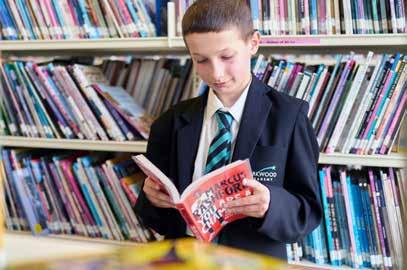
Two of the texts we study in English Literature are ‘A Christmas Carol’ by Charles Dickens and ‘An Inspector Calls’ by J B Priestley. These texts, chosen for their potential for challenge and abundance of enjoyment, come alive in the classroom and analysis flows. Students will also have the opportunity to study a range of poetry from the Literary heritage along-side contemporary poetry. They will be exposed to a range of amazing poets such as Wilfred Owen, Ted Hughes and Carol Ann Duffy as they study a cluster entitled ‘Power and Conflict’.
Happily, students at Parkwood also enjoy the most interesting, exciting and dramatic of Shakespeare’s plays in Key Stage 4, the wonderful ‘Macbeth’. This accessible and universal play is studied in terms of key scenes, enabling students to understand, enjoy and analyse this great work effectively.
In Years 10 and 11, all students will take two GCSE courses in English Language and English Literature. Students are expected to read widely, undertake a range of written responses and to speak in a range of formal situations.
There are two exams for Literature.
Paper 1 - Shakespeare and the 19th-century Novel. 1 hour 45 minutes (40% of GCSE).
Paper 2 - Modern Texts and Poetry. 2 hours 15 minutes (60% of the GCSE).
Exam Board - AQA
Contacts - Mr Webb sam.webb@pwa.e-act.org.uk
Graded - From 9-1
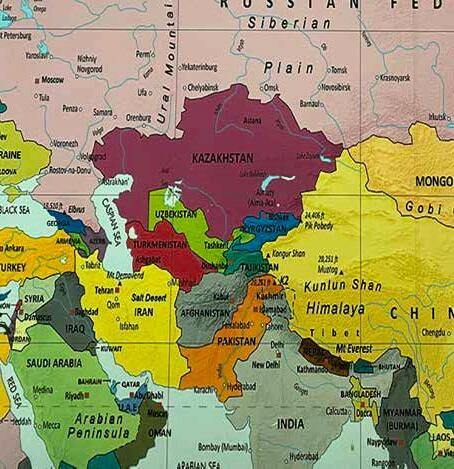
Geography is a varied course which allows lots of different topics to be covered over the two year course. There is an opportunity to develop your understanding of both human and physical Geography as well as a range of skills which you will be able to use in many other GCSEs and your future lives. If you enjoy learning outside of the classroom and completing projects then this course should be appealing to you. We will be looking at Geography in the real world both on a local and global scale.
Living with the physical environment:
• Natural Hazards
The living world
Physical landscapes in the UK
Living in the human environment: Urban challenges
The changing economic world
• The challenge of resource management
Geographical applications: Issue evaluation
• Fieldwork and geographical enquiry
There will be no coursework; just 3 exams at the end of the course.
Paper 1 - 1h 30 minutes
Paper 2 - 1h 30 minutes
Paper 3 - 1hr 15 minutes
Exam Board - Edexcel
Contacts - Mr Donnelly conor.donnelly@pwa.e-act.org.uk
Graded - From 9-1
GCSE History offers an exciting opportunity to step back through time to find meaning and relevance to our lives today. Over the two year course you will develop your ability to use original source material to gain deep understanding of the past and the people who lived in it. You will discover the impact of past societies on our life today.
Studying history can lead to a great number of excellent careers as diverse as the media, government, heritage organisations, academic research, teaching, archives, museums and the police and law.
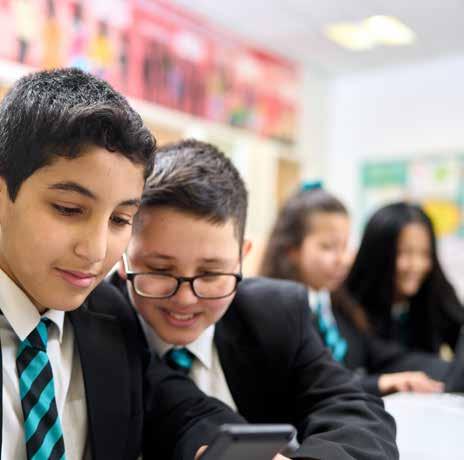
• Thematic study and historic environmentMedicine in Britain, c1250–present and The British sector of the Western Front, 1914–18: injuries, treatment and the trenches.
• Period study and British depth study - Early Elizabethan England, 1558–88 AND Superpower relations and the Cold War 1941-91.
• Modern depth study - Weimar and Nazi Germany, 1918–39.
In History, you are being assessed on how you deal with different elements of the past. By carrying out thematic and depth studies, you gain a developed understanding of many different factors that have had an effect of change and continuity with different societies. You also get the opportunity to deal with primary sources and secondary interpretations, developing your own views of the past. The study of History takes you around the globe, from Britain in the Middle Ages to life on the Western Front and later, the Cold War.
You will have three examinations cover the four units studied, each lasting 1 hour 15 minutes to 1 hour 45 minutes.
Exam Board - WJEC
Contacts - Mrs Husband (sarah. husband@pwa.e-act.org.uk) and Ms K O’Neill
Graded - Between L2 Distinction and L1 Pass
Hospitality and catering is a dynamic, vibrant and innovative sector delivering vital jobs, growth and investment in the heart of our local communities –important culturally, socially and economically. The sector is a major contributor to the UK economy, employing 2.9 million people and generating £130bn in economic activity, while paying £38bn in taxation to fund important local and national services. Hospitality is the 3rd largest private sector employer in the UK.
Business which make up the hospitality sector include;
• hotels, restaurant, coffee shops,
• pubs and bars, leisure parks, stadia, nightclubs,
• contract caterers, food service operators, entertainment and visitor attractions.
Employment can range from waiting staff, receptionists and catering assistants to chefs, hotel and bar managers, and food technologists working for supermarket chains. Some of these roles require further education and training either through apprenticeships or further and higher education.
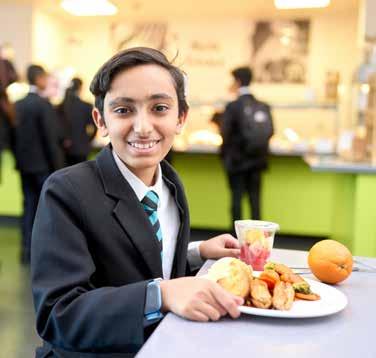
Hospitality and Catering Providers are needed in every country in the world. This means you will have opportunities to travel and work in other countries, enjoying all the experiences that come with it.
You will study two units in total, the first unit being a written exam. The written exam can be taken twice with the highest result contributing to your final grade. Unit 1 will be an understanding of how the Hospitality and Catering Industry works worth 40% of your grade:
• 1..1 Hospitality & Catering provision.
• 1.2 How Hospitality and Catering providers operate.
• 1.3 Health & Safety in Hospitality and Catering.
• 1.4 Food Safety in Hospitality & Catering.
Unit 2 will be the NEA that puts your knowledge into practice – the Hospitality and Catering Industry in Action worth 60%:
• 2.1 The importance of Nutrition.
• 2.2 Menu Planning.
• 2.3 The Skills and techniques of preparation cooking and presentation of dishes.
• 2.4 Evaluating cooking skills.
Exam Board - OCR Level 1/2
Contacts - Mr T Walsh
thomas.walsh@pwa.e-act.org.uk
Graded - Distinction/Merit/Pass
You may be interested in this if you want an engaging qualification where you will use your learning in practical, real-life situations, such as:
• Using different applications and tools to design, create and evaluate IT solutions and products. Creating a data manipulation solution. Creating an Augmented Reality prototype.
This will help you to develop independence and confidence in using skills that would be relevant to the IT sector.
The qualification will also help you to develop learning and skills that can be used in other life and work situations, such as:
• Planning and designing IT solutions and products for a given purpose. Selecting the best tools and techniques to solve a problem.
• Solving problems by exploring different software application tools and techniques. Creating IT solutions and digital products.
• Use of planning techniques to complete tasks in an organised and timely way. Finding imaginative ways to solve IT problems.
This qualification will enable you to learn about the different design tools that can be used, the principles of human computer interfaces and the use of data and testing when creating IT solutions or products. You will also understand the uses of Internet of Everything and the application of this in everyday life.
You will develop the skills to plan and design a spreadsheet solution to meet a client’s requirements. You will be able to use a range of tools and techniques to create the spreadsheet solution which will be tested, and you will learn to evaluate your spreadsheet solution.
Finally, you will develop the knowledge and skills relating to the purpose, use and types of Augmented Reality (AR) in different contexts and how it is used on different digital devices. You will develop the skills to design, create, test and review an AR model prototype.
60% Coursework
40% Exam
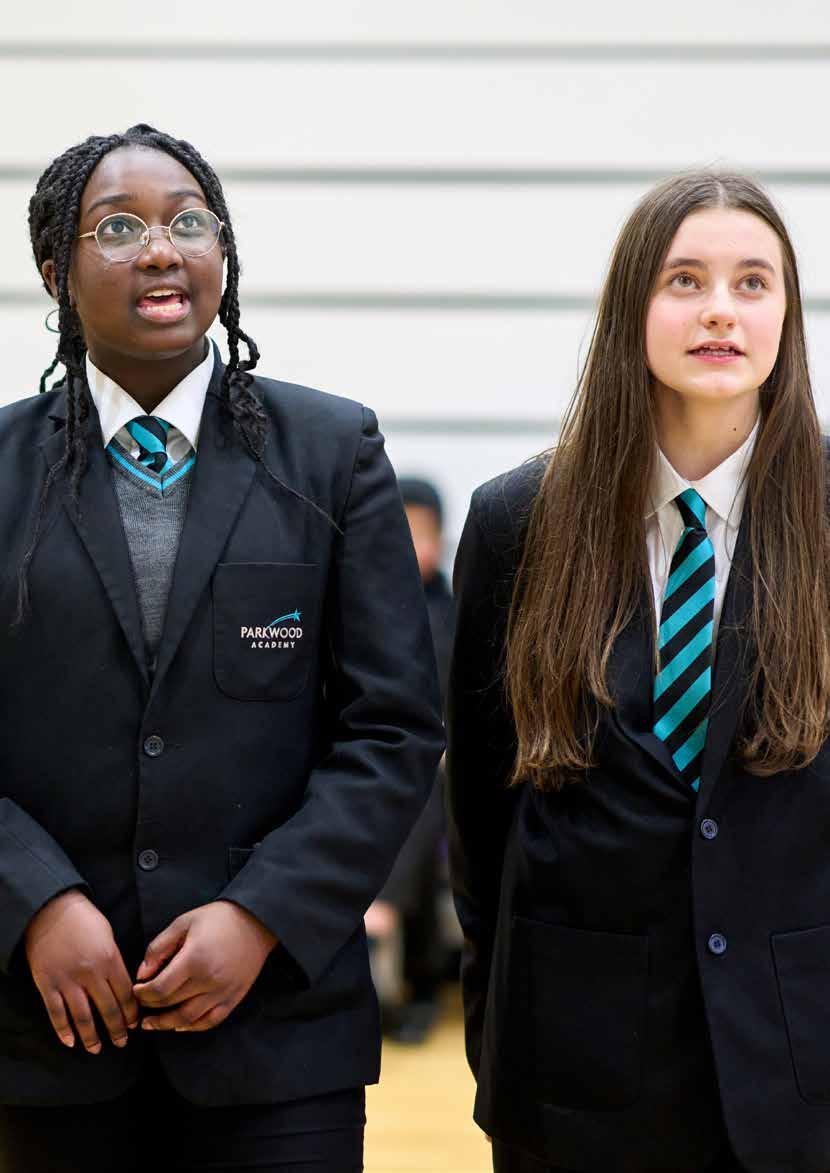

Exam Board - Edexcel Contacts - Mrs Barney lauren.barney@pwa.e-act.org.uk
Graded - From 9-1
Mathematics is for everyone. It is diverse, engaging and essential in equipping students with the right skills to reach their future destination, whatever that may be. Maths is a key requirement for many jobs and a Maths GCSE shows you have an understanding of numbers and the ability to work with them. Through studying maths you will learn that it is about more than just numbers; it’s also about thinking logically and being able to apply the principles you learn to everyday situations.
Almost all jobs and careers require a Mathematics GCSE, but the following are some that use Mathematics extensively:
The new GCSE Mathematics content has been divided into six main domains:
Students will use their knowledge and understanding to make connections between mathematical concepts and apply the functional elements of mathematics in everyday and real-life situations.
The content of the GCSE course is a natural progression from the Key Stage 3 syllabus. Topics covered in Year 10 will be revisited to ensure that progression through each unit of work is based on a solid foundation.
The GCSE will be assessed using the new 9-1 grading system where 9 is the highest grade. There has been an increase in breadth and depth of content and a greater emphasis on questions at the highest grades. The students will need to memorise more formulae than previously. The Edexcel GCSE in Mathematics (9-1) will be assessed through three equally weighted written examination papers either Foundation Tier or Higher Tier.
Each paper will have a range of question types, utilising both structured and unstructured questions. Grades 4 and 5 are the overlap grades between Foundation and Higher tiers, so common questions targeted at these grades will appear in the respective papers of each tier.
Foundation, Grades 1-5 (each paper 33.3% of GCSE)
Paper 1 - Non Calculator, 80 marks, 1hr 30 minutes.
Paper 2 - Calculator, 80 marks, 1hr 30 minutes.
Paper 2 - Calculator, 80 marks, 1hr 30 minutes.
Higher, Grades 4-9 (each paper 33.3% of GCSE)
Paper 1 - Non Calculator, 80 marks, 1hr 30 minutes.
Paper 2 - Calculator, 80 marks, 1hr 30 minutes.
Paper 2 - Calculator, 80 marks, 1hr 30 minutes.
Grading: 9-1 overall, with questions targeted at grades 1-5 at Foundation tier and at grades 4-9 at Higher tier.
Types of questions: Each paper will have a range of question types, utilising both structured and unstructured questions.
Exam Board - AQA
Contacts - Mrs K Birchall kristina.birchall@pwa.e-act.org.uk
Graded - From 9-1
This GCSE course will build on all prior knowledge from Key Stage 3, enhancing their cultural knowledge through authentic resources whilst building their vocab and grammatical knowledge. This knowledge will focus on 3 broad themes: Identity and Culture; Local, National, International and Global Areas of Interest and Future Study and Employment.
These themes will be broken down into sub-topics throughout the 2 year period and each topic will address the learning of all 4 skills, whilst also gaining cultural knowledge through project based learning.
The new specification for Spanish means that students now have the opportunity to access more authentic resources and learn about the Spanish culture in more depth. Our curriculum is designed to inspire a love of languages whilst broadening pupils’ horizons, teaching them communication skills and making them aware of different cultures in our increasingly global community. Students who choose to study Spanish will also enjoy enhanced career opportunities, given how highly valued languages are at both university and by employers.
The exams are split into 4 skills; listening, reading writing and speaking and each are worth 25% of the course for both Foundation and Higher papers. However, no mixed entries are permitted.
The listening exam requires candidates to listen to authentic spoken language, obtain information and respond appropriately. This exam has 2 sections;
• Questions are answered in English Questions are answered in Spanish.
At Foundation this exam is 35 minutes and at Higher it lasts 45 minutes.
The speaking exam has 3 elements; Role play situation to develop conversations, A photo card based on a visual stimulus to develop their ideas,
• A general conversation allowing them to speak spontaneously.
At Foundation this will be 7-9 minutes and at Higher 10-12 minutes.
The reading exam also has 3 sections; Candidates respond to written texts in English, Candidates respond in Spanish to comprehension questions based on authentic texts,
• Candidates demonstrate their ability to understand Spanish by translating a short text from Spanish into English.
At Foundation this is 45 minutes and at Higher this is 60 minutes.
The writing exam differs depending on tier.
• The Foundation exam is split into 4 sections;
• a short photo card to interpret; a writing task of 40 words based on 4 brief bullet points;
• a short translation (35 words) from English into Spanish a 90 word structured writing task based on 4 bullet points.
The Higher exam has 3 tasks; a 90 word writing task based on 4 bullet points; an open-ended writing task of 150 words based on 2 bullet points and a translation of a longer text (50 words) from English into Spanish.


Exam Board - Eduquas
Contacts - Mr S Swallow scott.swallow@pwa.e-act.org.uk
Graded - Distinction/Merit/Pass
This range of units are suitable for students who enjoy playing, performing, writing or listening to a variety of music.
Students will listen to and explore areas of study through music of various types; Western Classical Music, Popular Music of the 20th and 21st centuries and World Music. There will be an assessed performance in Year 11.
Students will perform 3 pieces of music of their choice and as part of a group or solo to complete the course. Performances should last no more than 15 minutes. There are marks awarded for difficulty, accuracy and musical expression.
Students will compose one piece for a combination of instruments, which will be performed live by Music in the Round.
Are you more interested in Music Technology than playing an instrument?
If you do not want to perform in a group, why not recreate your favourite track using state-of-the art music software?

You will be required to have one 20 minute instrumental lesson per week on an instrument of your choice.
Exam Board - AQA Contacts - Zoe Smart (Head of science - zoe.smart@pwa.e-act.org.uk) and Mr Mclean (Deputy Head of sciencedaniel.mclean@pwa.e-act.org.uk)
Graded - From 9-1
Physics is part of the Combined Science, Trilogy. This is a double award course which is equivalent to 2 GCSEs, you will be taught Biology, Chemistry and Physics topics within this course however your final qualification will be called ‘combined science’.
There are 21 required practicals that you must complete as part of your Combined Science course and many of these practicals will be assessed during your final GCSE examinations. There are many other experiments and demonstrations which you will take part in during Y10 and Y11. There is no longer a coursework (ISA) element to the GCSE Science course.
• Energy
Electricity
Particles model of matter
Atomic structure
• Forces Waves
Magnetism
Electromagnetism
Maths Skills: Mathematical skills are crucial to science and students will be expected to apply many different mathematical skills within their science lessons. In the GCSE science exams questions will target maths skills at a level of demand appropriate to each subject. In Foundation Tier papers questions assessing maths requirements will not be lower than that expected at Key Stage 3. In Higher Tier papers questions assessing maths requirements will not be lower than that of questions and tasks in assessments for the Foundation Tier in a GCSE Qualification in Mathematics.
2 Exam Papers
Each paper is 75 minutes long and you will sit all papers at the end of Y11. Each paper includes a range of multiple choice, structured, closed short answer, and open response questions.
As part of the Combined Science Trilogy you will sit a total of six papers (Biology, Chemistry and Physics).
Entry Level Science Qualification: In each year group a small number of students (including those who are new to English) may be entered for the AQA Entry Level certificate instead of the combined science GCSE. Your teacher will advise you if you have been selected for this qualification.
Triple Science: This pathway leads to 3 separate GCSE’s (Biology, Chemistry and Physics) and is intended for high achievers who want to pursue a career in science and study science A Levels.
Your exam for triple science will be 1hr 45mins long.
Exam Board - AQA
Contacts - Miss Nicholls
jennifer.nicholls@pwa.e-act.org.uk
Graded - From 9-1
This Religious Studies course includes learning about the beliefs, teachings and practices of two of the major world religions, Christianity and Buddhism
Students will also consider moral and ethical issues that affect the world around them. This is an option course, and all students who choose this as an option will complete the full course.
This GCSE course involves the study of religion and covers ethical issues such as, contraception, euthanasia, war and capital punishment. These topics allow students to have discussions and debates and include their own religious or cultural views both in lessons and in assessments.
This course is not only an academic qualification but one which challenges and enthuses students and encourages them to develop critical skills to question key beliefs and provide different solutions to ethical dilemmas.
Assessment
2 exams - 1h 45 minutes each
Paper 1: The Study of Religion
In this paper we look at beliefs, teachings and practices of both Christianity and Buddhism.
Religion 1: Buddhism
• The Dhamma (Dharma)
• The Buddha and the Four Noble Truths
Worship and Festivals
Buddhist Ethics
Religion 2: Christianity
• Key beliefs
• Jesus Christ and Salvation
Worship and Festivals
The role of the Church in the local and worldwide community.
Paper 2: Thematic Studies
In this paper we look at ethical and philosophical issues within the world and how religious beliefs may influence a view on these ethical issues. We study 4 themes which each apply religious teachings to the ethical dilemmas believers may face in 21st century Britain and the world.
Theme A: Relationship and Families
Sex, marriage and divorce
• Families and gender equality
Theme B: Religion and Life
• The origins and value of the universe
The origins and value of human life
Theme D: Religion, Peace and Conflict
Religion, violence, terrorism and war
• Religion and belief in 21st century conflict
Theme E: Religion, Crime and Punishment
• Religion, crime and causes of crime
Religion and punishment
Theme F: Religion, Human Rights and Social Justice
Religion and Human Rights
Religion, wealth and poverty
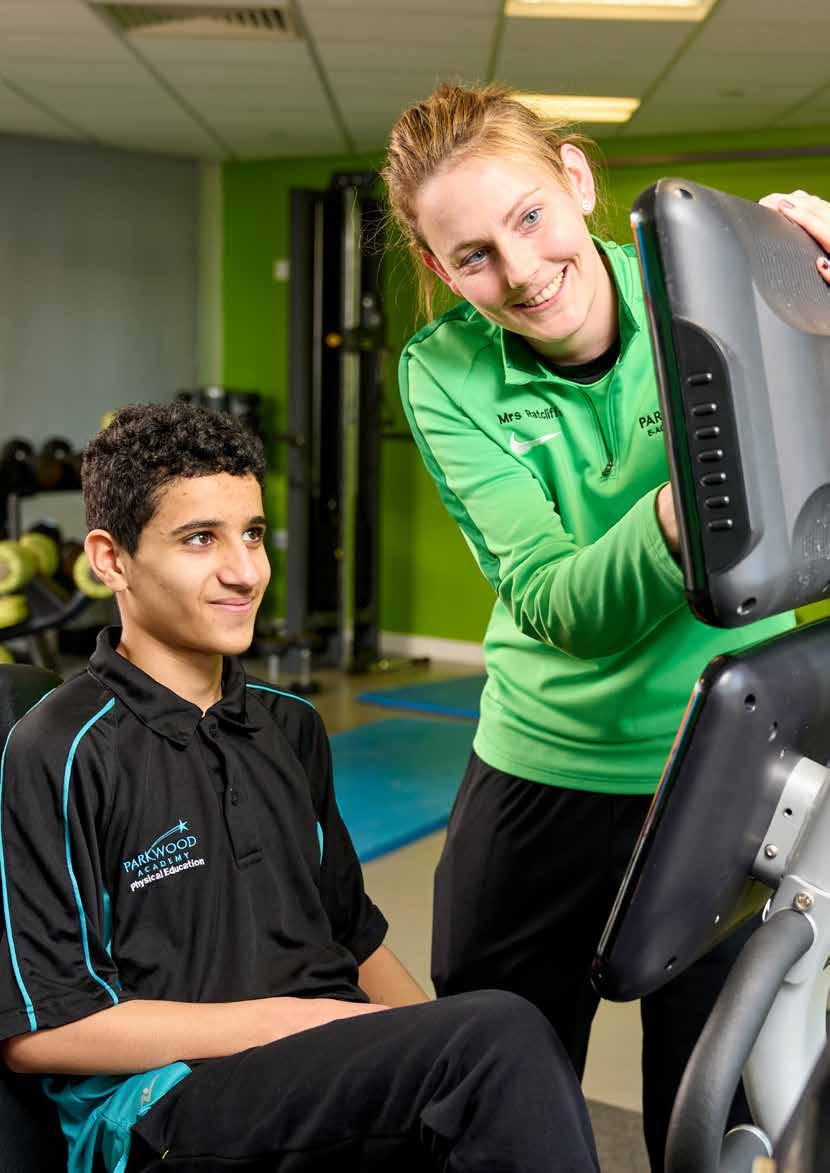
Exam Board - Edexcel
Contacts - Mr D Butterworth darren.butterworth@pwa.e-act.org.uk
Graded - Pass, Merit, Distinction
This course stimulates students’ understanding for sport in society, whilst improving practical performance in a range of activities. Students will have the opportunity to organise sporting events and create sporting opportunity for others.
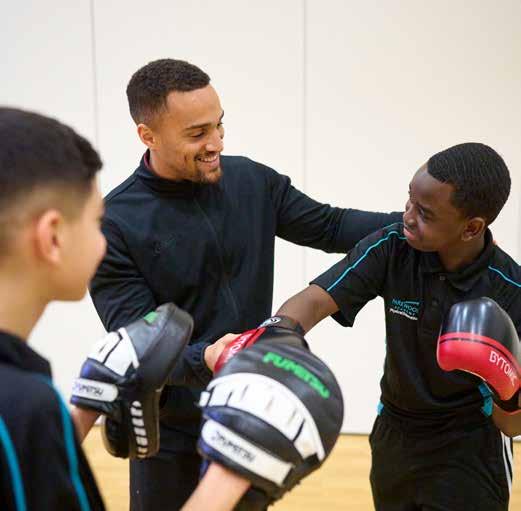
The course covers topics such as: Fitness
• Leadership
• Organisation of sporting events
Nutrition and much more.
This course is assessed by completing coursework and one computer-based exam.
Students will complete three lessons of PE per week, covering individual and team sports and fitness work.
Two lessons will be theoretical and one will be practical.
